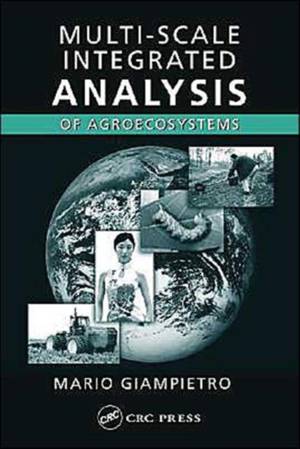
En raison d'une grêve chez bpost, votre commande pourrait être retardée. Vous avez besoin d’un livre rapidement ? Nos magasins vous accueillent à bras ouverts !
- Retrait gratuit dans votre magasin Club
- 7.000.000 titres dans notre catalogue
- Payer en toute sécurité
- Toujours un magasin près de chez vous
En raison de la grêve chez bpost, votre commande pourrait être retardée. Vous avez besoin d’un livre rapidement ? Nos magasins vous accueillent à bras ouverts !
- Retrait gratuit dans votre magasin Club
- 7.000.0000 titres dans notre catalogue
- Payer en toute sécurité
- Toujours un magasin près de chez vous
Description
Ecologists, agronomists, and others who may question the validity of current models for determining sustainable growth of agroecosystems, need a new set of analytical tools that more effectively address the complex nature of related processes. Those who challenge traditional assumptions of optimization and static factors in agricultural modeling demand new methods beyond differential equations and traditional statistical tests. Multi-Scale Integrated Analysis of Agroecosystems explores alternative ways to study agricultural sustainability, presenting new approaches to organizing data and applying complex systems theory to actual cases. This innovative text recognizes the changing dynamics of the multiple processes and cross-relations within an environment, proposing a clearer analysis of agroecosystems than that which can be provided by rigid, reductionist methods. Main concepts, new vocabulary and narratives, and practical examples open the book, followed by technical chapters that provide a more detailed explanation of concepts. The final section of the book presents a tool kit based on these concepts, resulting in strong support of empirical observations that challenge traditional notions regarding the sustainability of farming systems, food systems, and agroecosystems.
Spécifications
Parties prenantes
- Auteur(s) :
- Editeur:
Contenu
- Nombre de pages :
- 470
- Langue:
- Anglais
- Collection :
- Tome:
- n° 10
Caractéristiques
- EAN:
- 9780849310676
- Date de parution :
- 24-11-03
- Format:
- Livre relié
- Format numérique:
- Genaaid
- Dimensions :
- 177 mm x 261 mm
- Poids :
- 1006 g

Les avis
Nous publions uniquement les avis qui respectent les conditions requises. Consultez nos conditions pour les avis.






